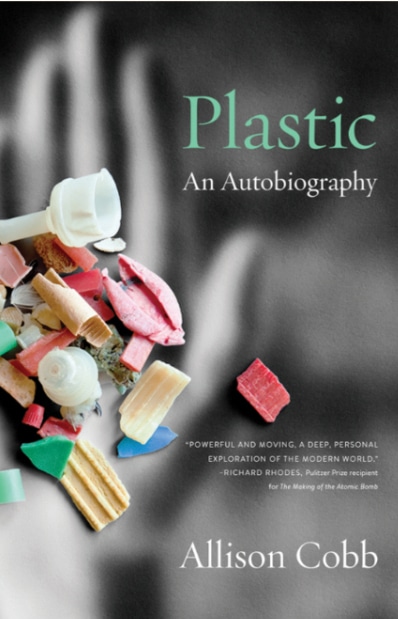
Author Allison Cobb during a recent interview at the Los Alamos Daily Post. Photo by Bonnie J. Gordon/ladailypost.com
 By BONNIE J. GORDON
By BONNIE J. GORDON
Los Alamos Daily Post
bjgordon@ladailypost.com
Plastic: An Autobiography, Allison Cobb’s recent book, begins with a plastic car part that leads her to explore the use up and throw away culture all around us.
“It’s my own life intersecting with plastic,” she said.
Combining prose and poetry, facts and dreams and the story of her life and the lives of others, Cobb’s book is a hybrid.
Cobb grew up in Los Alamos and now lives in Portland, Ore. Imagine a mixture of those two places and you’ll get a start on what Plastic is like. In spite of growing up in Los Alamos, Cobb is not a scientist. She’s a writer and poet.
“I never knew there were living poets until I got to college,” she said. “Things weren’t geared toward liberal arts. Growing up in Los Alamos, I developed an appreciation of scientists and technicians that has stayed with me. I’m fascinated by the culture of science and how science shapes technology”
Cobb is a writer for the Environmental Defense Fund and has spent her entire career helping EDF get out its message. Much as she admires the researchers who generate solutions and raise alarms, Cobb wanted to connect with a wider audience.
Cobb takes us back to the 1940s. History and scientific fact roll out the world where plastic was born. She covers territory as diverse as the designing of fighter planes and the sad fate of a baby albatross to the revelations about plastic she gleaned from her research.
“The one thing I learned was that plastic waste is not a side effect,” Cobb said. “After the war, people were saving plastic items meant to be thrown away. As one executive put it, ‘the future of plastic is the trash can.’ Corporations needed to convince people to throw this stuff away, and they did.”
Plastic packaging was the other bright idea corporations dreamed up to keep plastics factories running. Sealing up every conceivable thing in plastic was great at driving production, Cobb said.
“Plastics will be the cash cow for the oil and gas industry,” she said. “Cheap fracked gas is perfect for plastics.”
Another section of her book explores the impact of plastics on the poor, women and people of color. She travels to the Gulf where she encounters a town that has been fighting the nearby plastics plant for years. These folks on the Gulf also are dealing with plastic debris covering their beaches and the rising waters of global warming. Cobb was influenced by poet Carolyn Forche, a mentor during graduate school. Forche has been in the forefront of the “poetry as witness” movement.
This poetry seeks to bring to light the lived experience of those who too often don’t get their stories told. Cobb shows how the history of plastic has been written by upper class white guys, and how things might look different if other voices had been allowed to speak.
“For the first time, everything we do has a planetary impact,” she said. “We’re all enmeshed in the systems that run our lives. We get blinded to how things could be different. We need to replace the systems that don’t serve us well.”
Plastics: An Autobiography is a web of interconnections that bring us all together. It’s much like the world. Like it or not, our fates are bound tighter.
With the deck (and money) stacked against Cobb and others in the environmental movement, does she feel like giving up?
“We don’t have the luxury of giving up,” Cobb said. “We’re up against long odds, but the stakes are very high. I’ve learned a lot about resilience.”
Cobb’s book can be purchased on her website at allisoncobb.net.

